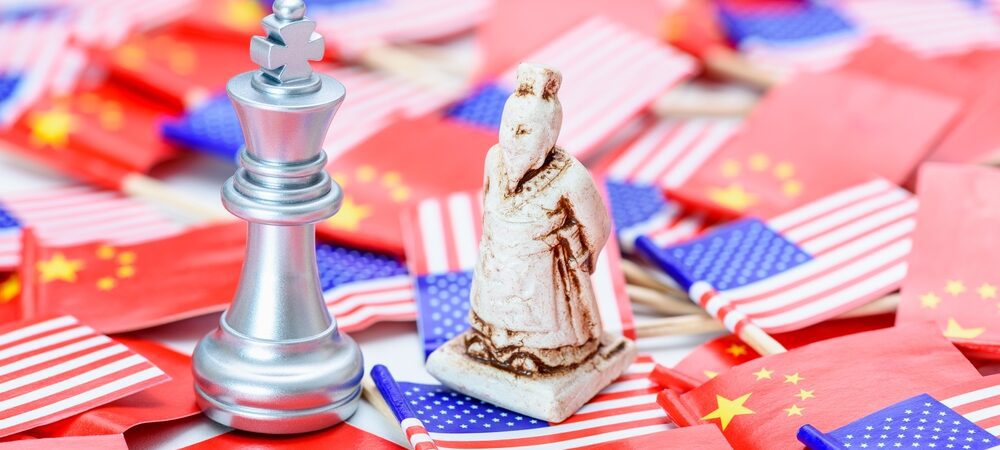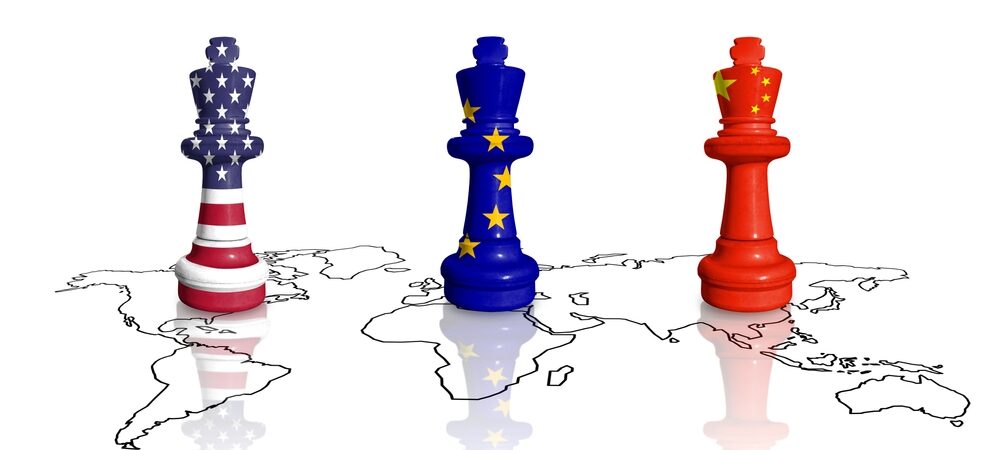WITA’s Friday Exchange Podcast: Knives Out for Tariffs – Dissecting the Supreme Court Debate on IEEPA
On this week’s episode of WITA’s Friday Exchange, trade law and legal experts dove into the cutting issues raised at this week’s IEEPA hearing. Are tariffs the appropriate tool to deal with an economic emergency? If not tariffs, what powers does IEEPA give the president? And what do butter knives and steak knives have to do with this case? Tune into this week’s episode to find out.
Featured Speakers:
Introduction: Kenneth Levinson, CEO, WITA – The International Trade Membership Association
Wendy Cutler, Senior Vice President, Asia Society Policy Institute; former Acting Deputy U.S. Trade Representative, Office of the U.S. Trade Representative
Kathleen Claussen, Professor of Law, Georgetown University Law Center; former Associate General Counsel, Office of the U.S. Trade Representative
Marty Lederman, Professor from Practice, Georgetown Law; former Deputy Assistant Attorney General, U.S. Department of Justice
Moderator: Michael Smart, Managing Director, Rock Creek Global Advisors; former Director for International Trade and Investment, National Security Council; former Trade Counsel, Democratic Staff, U.S. Senate Committee on Finance
Watch the Video on YouTube | Listen on Spotify or Apple Podcasts
Tariffs, IEEPA, and the Dog That Didn’t Bark
Grant D. Aldonas served as Majority Chief Trade Counsel to the U.S. Senate Committee on Finance; and Under Secretary of Commerce for International Trade. Following is an excerpt.
…Before both courts, the President argued IEEPA, which authorizes him to regulate and even prohibit imports, should be read broadly to embrace the power to impose tariffs as well. The CIT and CAFC rejected the claim the statutory language was sufficiently malleable to allow that conclusion.
In that, the courts were right. But, their close parsing of the statutory language missed a critical – and, in my view, dispositive – distinction between regulating imports and taxing them. Regulating imports does not raise revenue, tariffs do.
Why does that matter? A delegation of authority to impose tariffs is, in constitutional parlance, a revenue measure subject to the Origination Clause of Article I of the Constitution and the rules of the House and Senate governing the consideration of such legislation. The implications of the Origination Clause and House and Senate rules for the President’s argument are stark.
The Origination Clause of the Constitution requires all revenue legislation to begin in the House of Representatives, the elected body closest to the people. From there, revenue measures are subject to the rules governing either house of Congress. Those rules grant exclusive jurisdiction over revenue measures to the Ways and Means Committee in the House and to the Finance Committee in the Senate. The inclusion of subjects other than revenue measures in the legislation is irrelevant – jurisdiction over legislation incorporating revenue measures resides with Ways and Means and Finance.
Thus, if IEEPA incorporated a delegation of authority to impose tariffs – a measure that indisputably raises revenue – the bill would have been deemed a revenue measure within the scope of the Origination Clause of Article I of the Constitution. The legislation would have been automatically referred to the House Ways and Means Committee, which would have reported it to the floor for a vote by the House as a whole.
If the measure passed the House, it would have been sent to the Senate, where, as a revenue measure, it would have automatically been referred to the Finance Committee. The Finance Committee, in turn, would have reported the bill to the Senate floor for final passage.
None of that happened…
Read the Full Article Here
11/02/2025 | Grant Aldonas
Economic Security in North America
Emily Kilcrease, one of the authors of this piece, is a featured guest at WITA’s online event on November 14, the Role of USMCA in Great Power Competition.
The following is an excerpt:
The current geopolitical climate requires an approach to the USMCA review that integrates trade, investment, and economic security objectives. The uses of economic security tools, including export controls, investment restrictions, and tariffs, are at all-time highs. U.S. policy and strategy have moved decisively away from the non-discriminatory approach central to the old trade and investment architecture, as it seeks to manage the rise of the PRC as a strategic competitor (among other objectives). Many U.S. trading partners are also building their economic statecraft toolkit, raising the potential for an increasingly fragmented global economy.
Economic security alignment can build trust in integrated markets within North America, avoid unduly restricting regional trade and investment flows that pose minimal national security risks, and enable more effective common approaches to shared challenges from strategic competitors. Crucially, this approach requires a pivot away from global rules and institutions such as the World Trade Organization (WTO) and towards a new rules-based system among close partners that advances economic security goals alongside traditional economic objectives. The USMCA review provides an important opportunity to create a new economic security, trade, and investment regime in North America with these goals in mind.
USMCA, negotiated successfully by the first Trump administration, represents a gold standard trade agreement. It made critical updates to its outdated predecessor agreement, including in areas such as rules of origin, labor enforcement, and digital trade. The USMCA review presents an opportunity for the second Trump administration to build on this progress by updating the agreement to reflect its economic security priorities.
Read the Full Report Here
11/04/2025 | Emily Kilcrease and Geoffrey Gertz | Center for a New American Security
Kicking the Can Down the Road in U.S.-China Tensions

Sometimes in diplomacy doing a little is doing a lot and no news is good news. The high-profile meeting this week in South Korea between Presidents Donald Trump and Xi Jinping was their first in-person meeting since 2019 and it came after years of continually rising tensions between the two countries. The meeting’s major accomplishment may be that it occurred at all and did so without apparent rancor. Clearly, both sides aimed to project bonhomie between the two presidents, while dialing down the heat and trade tensions of recent months. President Trump pronounced the meeting “a great success!”
This is important, as the fraught U.S.-China relationship could certainly do with a little stability after a decade of steadily increasing comprehensive competition and the rollercoaster of the past nine months’ tit-for-tat trade actions between the two sides.
However, little of substance concerning the overall relationship was accomplished—or even discussed—at the meeting. The relatively brief one-hour, forty-minute meeting was totally about the bilateral commercial relationship, with apparently no other international or regional security issues discussed (although President Xi apparently congratulated President Trump for the role he played in achieving the Israel-Hamas accords and Gaza ceasefire). Surprisingly, even the touchy Taiwan issue did not come up (even in a perfunctory way in which each side normally delivers well-rehearsed positions), and it does not seem that Trump pressed Xi on China’s support for Russia’s war against Ukraine (and possibly playing a more constructive role in bringing about a ceasefire there). Nor was the South China Sea or other Asian security issues such as North Korea on the agenda.
The focus of the talks was entirely about trade and technology. Even in this domain there weren’t any new initiatives and agreements announced—as both sides essentially returned to the status quo of previous months. The forward progress had to do with returns to past positions. Both sides took their most punitive threats off the table: China agreed to suspend implementation of its global export control regime on products containing rare earth minerals mined and processed in China; in return, the United States said it would also pause export restrictions for one year on subsidiaries of Chinese companies already on Washington’s “Entity List.” For his part, Trump also took off the table his threatened 100% tariffs (which were due to come in force on November 1st) and he reduced tariffs related to fentanyl chemical precursors from 20% to 10%–thus lowering the overall U.S. tariff rate on China to 47%.
Read the Full Article Here
11/03/2025 | David Shambaugh | China-U.S. Focus
How Europe Became ‘Collateral Damage’ In The US-China Trade War

There is an uncomfortable truth hanging over Europe: its economic fate is increasingly tied to the ups and downs of US–China relations — a reality laid bare in the latest tit-for-tat of a trade war that’s left Europe as a battered and bruised bystander.
Since Beijing tightened export controls of rare earths in April in response to Washington’s steep tariffs, Europe has borne one of the heaviest burdens. Then, when the US last week persuaded China to hold fire for one year on additional restrictions due to come into effect at the start of December — in exchange for lowering its levies on Chinese goods to 47% from 57% — European officials and manufacturers alike breathed a sigh of relief.
Rare earths, which underpin the technologies that power drones, tanks, submarines and missiles, are crucial for the EU as it tries to build up its defence capabilities in the face of an increasingly belligerent Russia. The critical minerals are also essential for much of the hardware Europe relies on for its green transition, including batteries that are essential for electric vehicles and solar panels.
“Europe increasingly finds itself in a position it never wanted to be in, meaning to be the battleground of the strategic rivalry between the US and China,” said Gunnar Wiegand, a visiting distinguished fellow at the German Marshall Fund, who previously worked as a former diplomat at the European External Action Service.
Read the Full Column Here
11/03/2025 | Federica Di Sario | The Parliament
WITA – We put the community in trade community.
Information about upcoming WITA and trade community events







